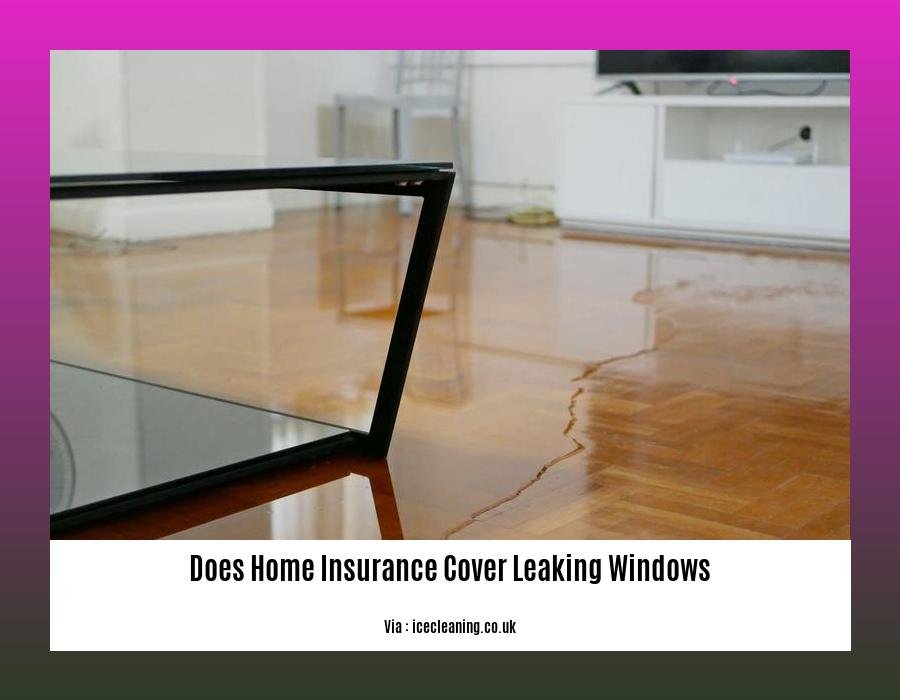1. Does Home Insurance Cover Leaking Windows: Understanding Coverage and Protection
With the unpredictable nature of weather and aging structures, window leaks are a common concern among homeowners. However, many are unsure whether their home insurance policies extend coverage to these unfortunate incidents and the resulting property damage. In this comprehensive guide, we’ll delve into the intricacies of home insurance policies, examining the coverage options available for leaking windows, and providing valuable tips for filing successful claims. Join us as we navigate the complexities of insurance policies and discover the extent of protection provided for this prevalent homeownership issue.
Key Takeaways:
-
Home insurance policies usually do not cover leaking windows because they are considered a maintenance issue that is the homeowner’s responsibility to fix.
-
Some insurance policies may offer coverage for damages resulting from water leaks from windows, but not for the cost of repairing or replacing the windows themselves.
-
It is imperative to read and understand the terms and conditions of your insurance policy regarding water damage and window repairs to ascertain the extent of coverage provided.
Does Home Insurance Cover Leaking Windows?

A prevalent concern among homeowners is whether their home insurance policy covers leaking windows. This article delves into the intricacies of home insurance coverage for leaking windows, providing clarity on this matter.
The General Rule
In general, home insurance policies do not cover the cost of repairing or replacing leaking windows. This is because leaking windows are typically considered a maintenance issue, and it is the homeowner’s responsibility to maintain their property. However, there are some exceptions to this rule.
Exceptions to the Rule
Some home insurance policies may cover damage caused by the water that leaks through a window, but not the cost of fixing the window itself. For example, if a leaking window causes water damage to your flooring or furniture, your home insurance policy may cover the cost of repairing or replacing the damaged items.
Endorsements and Riders
In some cases, you may be able to purchase an endorsement or rider to your home insurance policy that will cover the cost of repairing or replacing leaking windows. An endorsement is a specific addition to your policy that provides coverage for a specific peril, such as water damage. A rider is a separate policy that provides coverage for a specific type of property, such as windows.
Checking Your Policy
The best way to determine if your home insurance policy covers leaking windows is to check your policy carefully. Your policy should state what types of perils are covered and what types of property are covered. If you have any questions about your coverage, you should contact your insurance company.
Preventing Leaking Windows
There are a number of things you can do to prevent leaking windows, including:
- Inspect your windows regularly for signs of wear and tear.
- Caulk and seal windows properly to prevent water from seeping in.
- Trim trees and branches near your windows to prevent them from damaging the windows.
- Keep your gutters and downspouts clean and free of debris to prevent water from backing up and leaking into your windows.
Filing a Claim
If you do experience a leaking window, you should file a claim with your home insurance company as soon as possible. The claims process can vary from company to company, but you will typically need to provide the following information:
- Your policy number
- The date the damage occurred
- The cause of the damage
- A description of the damage
- Photographs of the damage
Once you have filed a claim, your insurance company will send an adjuster to inspect the damage and determine how much it will cost to repair or replace the damaged items.
Did you know that your home insurance may cover the electrical issues that may arise in your property? Read more about it here: does home insurance cover electrical issues.
If you are worried about whether your home insurance covers garage door issues, you can get all the answers here.
Does your home insurance cover pest control? Find out more here.
If you are wondering if your home insurance covers electrical issues, don’t keep yourself in the dark, find out here.
Tips and Advice for Homeowners to Prevent Window Leaks and Maintain Windows to Minimize the Risk of Water Damage.
As a homeowner, dealing with leaky windows can be a real pain, not to mention the potential damage to your property. But before you panic, let’s take a closer look at what home insurance covers and some proactive steps you can take to prevent leaks in the first place.
Common Causes of Window Leaks
Leaks can be caused by a variety of factors, including:
-
Improper installation: Windows that are not properly installed are more likely to leak.
-
Old age: As windows age, the seals and weatherstripping can deteriorate, leading to leaks.
-
Environmental factors: Heavy rain, strong winds, and hail can all put stress on windows and cause them to leak.
Prevention and Maintenance
The best way to deal with leaky windows is to prevent them from happening in the first place. Here are a few tips:
-
Inspect your windows regularly: Look for signs of damage, such as cracks in the glass, gaps around the frame, or deteriorating caulk.
-
Caulk and seal around windows: Apply a fresh bead of caulk around the frame of your windows to seal any gaps and prevent water from seeping in.
-
Trim trees and branches: Trees and branches that hang over your windows can rub against the glass and cause damage. Trim them back to prevent this from happening.
-
Keep gutters clean: Clogged gutters can cause water to back up and leak into your windows. Clean your gutters regularly to prevent this.
What to Do If You Have a Leaky Window
If you do have a leaky window, there are a few things you can do:
-
Dry the area: Immediately dry the area around the leak with a towel or mop.
-
Find the source of the leak: Inspect the window for cracks, gaps, or other damage that may be causing the leak.
-
Repair the leak: If you can identify the source of the leak, you may be able to repair it yourself with a little caulk or weatherstripping. If the damage is more extensive, you may need to call a professional.
Key Takeaways:
-
Home insurance typically covers damage caused by leaking windows, but not the cost of repairing or replacing the window itself.
-
Regular inspection and maintenance of windows can help prevent leaks.
-
If you have a leaky window, dry the area immediately, find the source of the leak, and repair it.
-
If the damage is extensive, you may need to file a home insurance claim.
-
Source: americanpremierclaims.com/window-leaks-insurance-claims-what-you-need-to-know/
-
Source: windowsonlineuk.co.uk/blog/find-fix-prevent-window-water-leaks/
Steps involved in filing a home insurance claim related to leaking windows, documentation required, and communication with the insurance company.

With homeowners insurance, dealing with the repercussions of a leaking window can be daunting. But fear not! Filing a successful insurance claim is possible by following the proper steps and documentation procedures. Let’s dive in and ensure you’re well-equipped to navigate the claims process.
Key Takeaways:
- Home insurance policies typically cover damages caused by leaking windows, but not the repairs to the windows themselves.
- Filing a claim involves notifying your insurance company promptly, providing detailed documentation, and maintaining clear communication throughout the process.
- Ensure to document the damage thoroughly with photos, videos, and estimates.
- Keep a record of all communication with the insurance company, including phone calls, emails, and letters.
- Hiring an insurance adjuster is optional but can provide valuable expertise in handling the claim.
1. Recognizing the Damage:
A leaking window can manifest in various ways. Keep an eye out for telltale signs like water stains, damaged window frames, mold growth, or drafts. These indications signify a potential insurance claim.
2. Contacting Your Insurance Company:
Time is of the essence when it comes to filing a claim. Notify your insurance company as soon as possible, ideally within 24 hours of discovering the damage. Prompt reporting ensures a smoother claims process.
3. Documenting the Damage:
Thorough documentation is crucial for a successful claim. Gather evidence of the damage, including:
- Visual Evidence: Take clear photos and videos of the leaking window, both inside and outside. Ensure the photos capture the extent of the damage and any visible signs of water infiltration.
- Detailed Description: Write a detailed account of the damage, including the date you discovered the leak, the location of the leaking window, and any other relevant information.
- Estimates for Repairs: Obtain estimates from qualified contractors or window repair professionals to demonstrate the cost of repairing or replacing the damaged window.
4. Filing the Claim:
Filing the claim typically involves submitting a claim form, along with the supporting documentation you’ve gathered. Ensure you provide accurate and complete information on the form.
5. Communication with the Insurance Company:
Maintain open communication with your insurance company throughout the claims process. Respond promptly to any requests for additional information or documentation. You may also want to consider hiring an insurance adjuster to represent your interests and negotiate on your behalf.
6. Patience and Persistence:
The claims process can sometimes be lengthy. Be patient and persistent in following up with the insurance company. Keep track of all communication and document any developments related to your claim.
Conclusion:
Dealing with a leaking window can be stressful, but having homeowners insurance provides a safety net. By following the steps outlined above, documenting the damage thoroughly, and maintaining clear communication with your insurance company, you can navigate the claims process effectively and seek compensation for the damages caused by the leaking window.
Sources:
- Filing a Home Insurance Claim for Leaking Windows
- What to Do If You Have a Leaking Window
Real-life examples or case studies of homeowners who have experienced leaking windows and how their insurance policies responded.
Key Takeaways:
- Home insurance policies usually cover the damage caused by leaking windows, not replacing the windows themselves.
- Endorse’s coverage and riders can be purchased to cover the cost of replacing leaking windows.
- Filing a claim with the insurance company is typically required when seeking compensation for window leaks.
- Hiring an insurance adjuster is not required but recommended to ensure an expert is on the homeowner’s side during the claims process.
Imagine Sarah, a diligent homeowner who takes pride in maintaining her cozy abode. One fateful day, she discovers a persistent leak emanating from her living room window. Despite her best efforts to seal the leak, the water continues to seep in, causing damage to her furniture and flooring. Faced with this unexpected predicament, Sarah turns to her home insurance policy for assistance.
Upon filing a claim, Sarah is informed that her policy covers the water damage caused by the leaking window. However, the policy does not provide coverage for replacing the window itself. Determined to find a solution, Sarah explores additional options and discovers an endorsement that specifically covers window leaks. After purchasing the endorsement, Sarah is relieved to know that her insurance policy will cover the cost of replacing the damaged window.
In a similar situation, John, a meticulous homeowner, encounters a persistent leak around his kitchen window. Despite his attempts to identify the source of the leak, the water continues to seep in, causing damage to his cabinets and appliances. John promptly contacts his insurance company and files a claim.
Much to John’s dismay, his insurance policy does not cover the cost of repairing or replacing the leaking window. However, the policy does provide coverage for the water damage caused by the leak. Undeterred, John decides to hire an insurance adjuster to assist him with the claims process. The adjuster thoroughly inspects the damage and negotiates with the insurance company, resulting in a fair settlement that covers the cost of repairing the water damage.
These real-life examples illustrate the importance of carefully reviewing home insurance policies, understanding the extent of coverage, and exploring additional options such as endorsements or riders. Homeowners should also consider hiring an insurance adjuster to ensure they receive fair compensation for damages caused by leaking windows.
Relevant URL Sources:
- Does Homeowners Insurance Cover Water Leaks? | Insure.com
- Does Homeowners Insurance Cover Leaking Windows? – HomeownersInsuranceCover.net
FAQ
Q1: Does homeowners insurance cover the cost of repairing leaking windows?
A1: Generally, homeowners insurance does not cover the repair or replacement of leaking windows, as it is typically considered a maintenance issue. However, some policies may provide coverage for the damage caused by the water leak, such as repairs to the drywall or flooring.
Q2: What type of window damage is typically covered by homeowners insurance?
A2: Homeowners insurance may cover damage to windows caused by certain perils, such as storms, hail, or vandalism. However, it is essential to check your specific policy to determine the exact coverage provided.
Q3: What should I do if I discover a leaking window in my home?
A3: If you find a leaking window, it is important to take immediate action to prevent further damage. This may involve contacting a contractor to repair the leak or filing a claim with your homeowners insurance company if the damage is covered.
Q4: How can I prevent leaking windows in the future?
A4: To prevent leaking windows, it is important to regularly inspect and maintain your windows, ensuring that the frames and seals are in good condition. Additionally, addressing any issues with the roof or gutters that may contribute to water leaks can also help prevent window leaks.
Q5: What is the claims process for window leaks covered by homeowners insurance?
A5: The claims process for window leaks covered by homeowners insurance typically involves contacting your insurance company, providing documentation of the damage, and obtaining an estimate for repairs. The insurance company will then review the claim and determine the amount of coverage available.
- Find the Perfect Santa Mugs: Year-Round Guide - July 6, 2025
- Find the Perfect Collectible Santa Figurines: A Guide - July 6, 2025
- Find the Perfect Santa Claus Toys: Holiday Gift Guide - July 6, 2025










